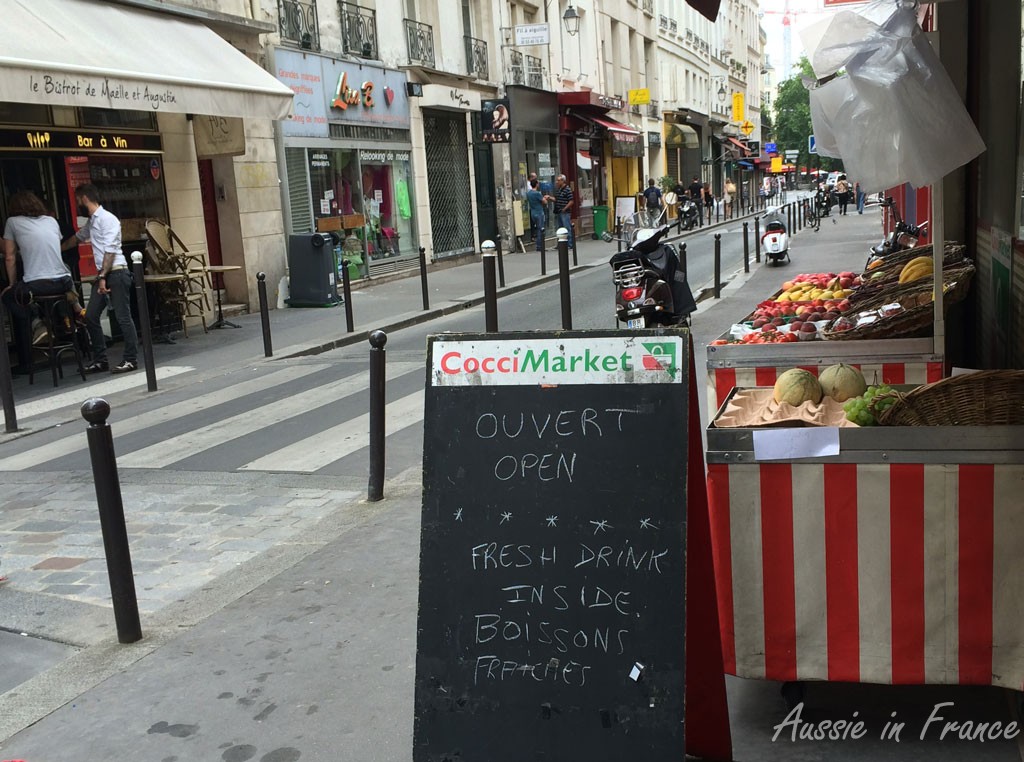I keep walking past this little grocery store in our neighbourhood and seeing the sign: “fresh drink inside – boissons fraîches” and wondering whether tourists really understand that he’s selling cold drinks.
Tu as de l’eau fraîche? does not mean “Do you have fresh water?”, but “Do you have cold water?” L’eau froide is used as opposed to l’eau chaude, that is, cold water out the tap and not hot water. You can also say l’eau glâcée (iced water) to mean cold water out the fridge. And fresh water (as opposed to salty water) is eau douce.
L’air frais, on the other hand, means fresh air while l’air froid means cold air, as you would expect.
You can have légumes frais (fresh vegetables), oeufs frais (fresh eggs), pain frais (fresh bread) and peinture fraîche (fresh paint). However, a fresh coat of paint is une nouvelle couche de peinture.
In fact, nouveau or nouvelle is always used when the intended meaning is new e.g. une nouvelle feuille de papier = a fresh sheet of paper, to make a fresh pot of tea = refaire du thé, to make a fresh start = prendre un nouveau départ, a fresh face = un nouveau visage (as in someone you haven’t seen before) and fresh fields and pastures are nouveaux horizons, which is rather amusing. I wonder to what extent it reflects French and English thinking?
Nouvelles fraîches means recent news – we’d hardly talk about fresh news, would we?
Je ne suis pas très frais ce matin means I’m not feeling the best today (probably as the result of a late night).
Argent frais can mean either ready cash or fresh money depending on the context.
To say it’s cool or chilly, we also use frais – il fait frais. And servir frais means serve cold or chilled.
In weather-related contexts, grand frais is, surprisingly, used for near gale while joli or bon frais is a strong breeze. But those are nautical terms.
If you’re talking about fresh coffee that has just been ground, you have to say café moulu and not café frais, which means freshly made coffee.
When fresh means cheeky, you never use frais, but rather impertinent or familier. I tried to find out from Jean Michel how to say “don’t get fresh” in French but he couldn’t think of anything. I can imagine a teenager responding with something like, “Ca va pas, non?”
Any suggestions?






I’ve let my French get much too rusty. And of course Canadian French is quite different from that in France.
Yes, Canadian French does have quite a few differences.
I’d probably say “fraîchement moulu” rather than just “café moulu” for newly ground coffee, because “café moulu” is what’s written on the packets of pre-ground (= definitely not fresh) coffee.
Thank you, Will. Your comment prompted me to do some research. It seems that “fresh coffee” isn’t quite what I thought! http://blog.dailygrind.com/what-is-fresh-coffee/.
So we should in fact say “café fraîchement moulu” for “freshly ground coffee” and “café moulu” for “pre-ground coffee” or “ground coffee”, as you say. True “fresh coffee” is that which has been recently roasted so would be “café fraîchement torréfié”.